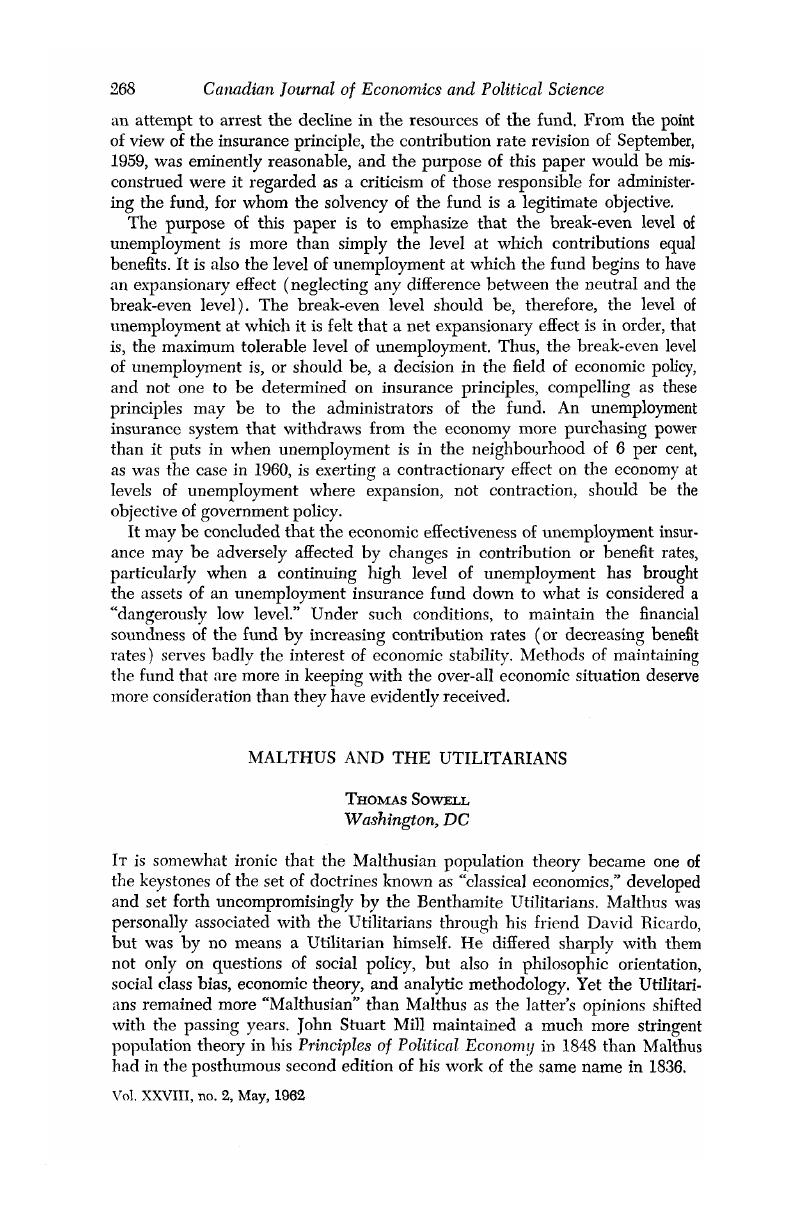Article contents
Malthus and the Utilitarians
Published online by Cambridge University Press: 07 November 2014
Abstract

- Type
- Notes and Memoranda
- Information
- Canadian Journal of Economics and Political Science/Revue canadienne de economiques et science politique , Volume 28 , Issue 2 , May 1962 , pp. 268 - 274
- Copyright
- Copyright © Canadian Political Science Association 1962
References
1 The Works and Correspondence of David Ricardo, ed. Sraffa, P. (Cambridge, 1957), II, 109–11Google Scholar; VII, 201.
2 Somervell, D. C., English Thought in the Nineteenth Century (London, 1954), 35 Google Scholar; Wallas, Graham, The Life of Francis Place (New York, 1951), 167 Google Scholar; Roll, Eric, A History of Economic Thought (London, 1954), 197, etc., etc.Google Scholar
3 Boulding, Kenneth E., “Foreword,” in Malthus, Thomas Robert, Population: The First Essay (Ann Arbor, 1959 [originally London, 1798]), x.Google Scholar
4 Malthus, , “Introduction,” Principles of Political Economy (2nd ed., New York, 1950 [originally London, 1836])Google Scholar; Malthus to Ricardo, Oct. 26, 1820, Works and Correspondence of David Ricardo, VIII, 286.Google Scholar But cf. Essay on Population, 2nd ed., (Everyman, ed.), II, 245.Google Scholar
5 “Want has not unfrequently given wings to the imagination of the poet, pointed the flowing periods of the historian, and added acuteness to the researches of the philosopher …” Malthus, , Population: The First Essay, 125.Google Scholar
6 Ibid., 126.
7 The Works and Correspondence of David Ricardo, II, 338.Google Scholar
8 Malthus, quoted in Place, Francis, Illustrations and Proofs of the Principle of Population, ed. Himes, N. E. (London, 1933), Appendix A, 286.Google Scholar
9 Malthus, , Population: The First Essay, 138–9.Google Scholar
10 Malthus, quoted in Place, , Illustrations and Proofs, 287.Google Scholar
11 The speed of an automobile is limited by the power of its engine, but presumably it is regulated by the judgment of the driver.
12 Moral restraint was defined as “the restraint from marriage which is not followed by irregular gratifications …” Malthus, , The Principle of Population (2nd ed., London, 1933), I, 14.Google Scholar
13 Stigler, George J., “The Ricardian Theory of Value and Distribution,” Journal of Political Economy, 06, 1952, 191.Google Scholar
14 “Indeed I should always particularly reprobate any artificial and unnatural modes of checking population, both on account of their immorality and their tendency to remove a necessary stimulus to industry.” Malthus, quoted in Place, , Illustrations and Proofs, 286.Google Scholar
15 “Men are born into the world in every country where the cultivation of the earth is practised, with the natural faculty in each man of producing more food than he can consume, a faculty which cannot be controled but by the injurious exclusions of human institution.” Godwin, William, Enquiry Concerning Population (London, 1820), VI, chap. IV, 554.Google Scholar
16 Population: The First Essay, 22.
17 Ibid., 25.
18 Ibid., 22–3.
19 Senior, Nassau W., Political Economy (New York, 1938 [originally London, 1836]), 47–8.Google Scholar
20 Ibid., 43.
21 Population: The First Essay, 54. Substantially the same statement reappears in the second edition, II, 4–5.
22 The Principle of Population, 2nd ed., II, 260.Google Scholar
23 Illustrations and Proofs, 152–5. Also Cobbett, William, Rural Rides (Everyman, ed.), I, 87.Google Scholar
24 Principles of Political Economy, 2nd ed., 226.Google Scholar
25 Ibid., 228, 229, 231, 250.
26 Ibid., 320.
27 Russel, Bertrand, Freedom and Organizstion (London, 1952), 93.Google Scholar
- 5
- Cited by


